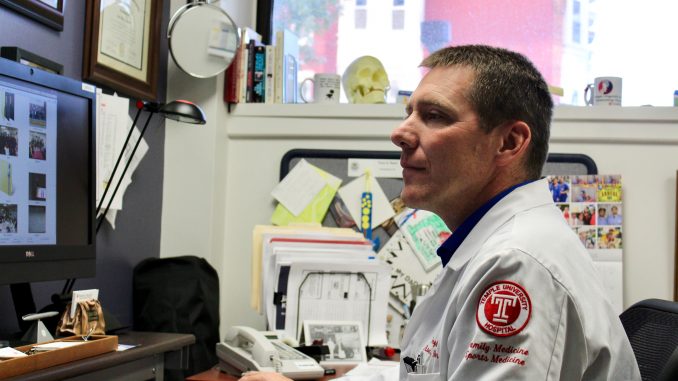
Health professionals, including a Temple University Hospital medical officer, are speaking out against gun violence.
Last week, the National Rifle Association tweeted to tell health professionals, namely the American College of Physicians, the world’s largest medical-specialty society, to “stay in their lane,” after several authored a position paper in the Annals of Internal Medicine calling for the United States to address firearm violence with public health-minded solutions.
The tweet came before another mass shooting in Thousand Oaks, California, which raised the 2018 total to 307 acts of mass gun violence so far this year, according to the Gun Violence Archive, an ongoing database for shootings in the U.S.
Medical professionals from public health institutions across the country replied to the NRA’s tweet with photos of bloody scrubs and operating rooms, arguing that gun violence is a health issue that lies “in their lane.”
Dr. Tony Reed, a TUH associate chief medical officer, had spoken out earlier against gun violence in public spaces, predating the #ThisIsMyLane hashtag used by medical professionals. He wrote an article in the medical publication Health Affairs in October, calling for greater security and safety protocols in school buildings after his son’s former school was attacked by a gunman.
His son attended Great Mills High School in southern Maryland. The gunman, who was a student at the school, shot and injured two students before being stopped by the school’s resource officer. The gunman died on the scene.
His son, Anderson, has since changed schools due to the trauma of the shooting.
Even before the shooting at his son’s former school, Reed wrote that he had previously lobbied members of Congress to increase gun safety and advocate for improved security in schools. The shooting did not change Reed’s support for the Second Amendment, but brought the topic of gun safety into his reality.
“I haven’t seen anything done,” Reed said. “I say this in both directions, for those who are advocates and those who are non-advocates: I don’t see anyone moving in any direction. I hear a lot of people talking. I hear a lot of people on each end of the spectrum saying it must be this way, but I see no change.”
Reed grew up in Hughesville, Pennsylvania and was a hunter and gun owner. He wrote in Health Affairs that he supports responsible gun use.
“But I feel just as strongly that we must ban civilian-owned assault-style rifles that serve no purpose but to destroy human flesh,” Reed wrote in the Health Affairs article.
Reed also called for more civilian precautions, including increased security in public buildings and trainings for active assailant practices like the Department of Homeland Security’s Run, Hide, Fight, which university officials utilize to teach their employees.
He also supports trainings for “Stop the Bleed,” a campaign that teaches hemorrhage prevention and instructs civilians how to prevent death from blood loss.
There has been a push on Main Campus to increase student and faculty readiness for active assailant situations through trainings and protocol advertisements.
“When you’re looking at gun safety or gun violence, it’s more than law enforcement, it’s more than just judges, more than legislation, it’s a whole community that needs to come together,” said Charlie Leone, the executive director of Campus Safety Services.
“Everything from people who are possessing the gun and how they keep themselves safe with the gun and how to store it, to looking at the laws on gun ownership and permits, it’s real important for us as a community to look at every aspect,” Leone added.
Leone said emergency protocol and building safety for active assailant situations are a campus-wide effort to reduce the risks of gun violence. He said Temple Police encourages students that if they “see something, say something” and report suspicious activity to TUPD.
Junior political science and economics major Benjamin Aitoumeziane, who is the vice president of external affairs for the Temple College Democrats, said there are more ways the U.S. can prevent gun violence.
“We can do better in this country,” Aitoumeziane said. “We’ve done better. We’ve sent a man to the moon. We’re a great nation in many ways. This is something that we’re trying to keep track of. Internationally, people are looking at us like, ‘What is going on over there?’”


Be the first to comment